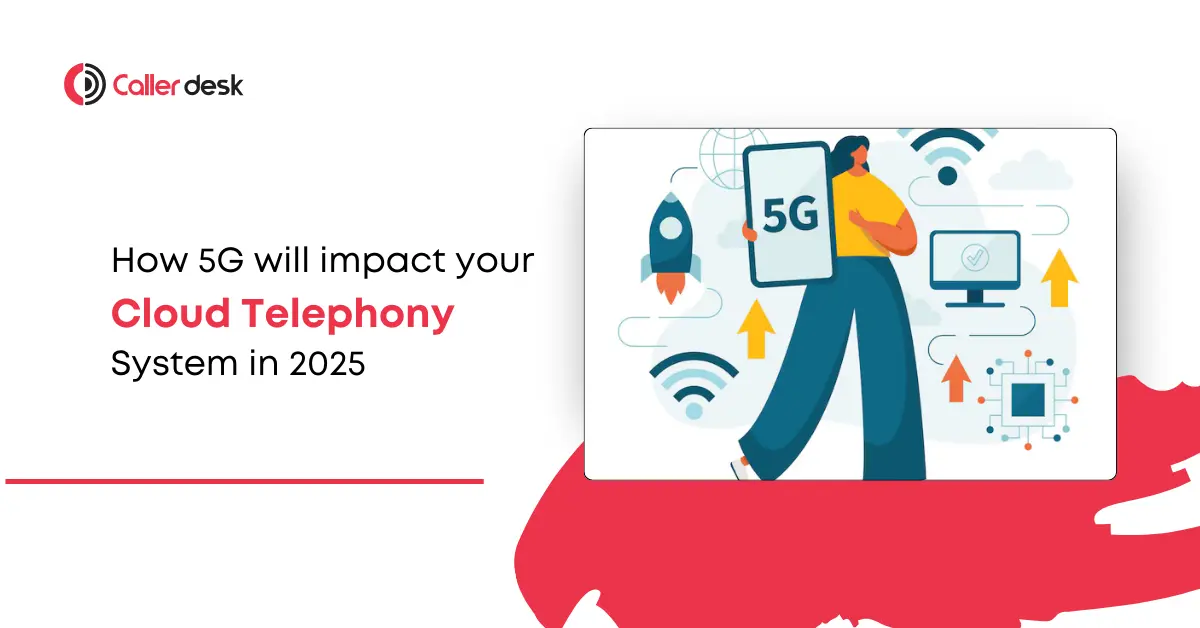Imagine this: A world where business communication is faster, clearer, and more reliable than ever before. This isn’t just a dream—it’s the reality 5G technology is poised to deliver.
- 1 1. Say Goodbye to Poor Call Quality: Superior Clarity with Low Latency
- 2 2. Scale Effortlessly: 5G’s Expanded Network Capacity
- 3 3. Smarter Operations: Advanced IoT and AI Integration
- 4 4. Work Anywhere: Enhanced Mobility for Remote Teams
- 5 5. Stay Secure: Strengthened Security and Compliance
- 6 6. Addressing 5G Implementation Challenges
- 7 Preparing for the 5G Era in Cloud Telephony
- 8 Conclusion
- 9 Frequently Asked Questions
With ultra-fast speeds, minimal delays, and enhanced connectivity, 5G will transform cloud telephony systems, making them smarter, more efficient, and better suited for modern business demands.
But 5G isn’t just about speed—it’s about unlocking new possibilities like seamless AI and IoT integration, improved mobility, and strengthened security. In this guide, we’ll explore how 5G will reshape cloud telephony by 2025 and address potential challenges businesses might face.
1. Say Goodbye to Poor Call Quality: Superior Clarity with Low Latency
5G’s ultra-low latency ensures delays in voice and data transmission are nearly eliminated. This translates to crystal-clear calls, free of echoes or dropped connections.
- Deliver seamless communication experiences that build trust with customers.
- Manage high call volumes without compromising on call quality.
Pro Tip: Businesses leveraging 5G-compatible cloud telephony systems can stand out by offering an exceptional customer experience, no matter the circumstances.
2. Scale Effortlessly: 5G’s Expanded Network Capacity
With its high bandwidth, 5G can handle more concurrent calls and traffic spikes with ease.
- Call centers and e-commerce platforms can manage demand during peak seasons without worrying about service degradation.
- Small businesses and startups can grow rapidly without bandwidth constraints.
Example: A retailer managing holiday season traffic can rely on 5G’s scalability to ensure consistent service quality despite surging customer inquiries.
3. Smarter Operations: Advanced IoT and AI Integration
5G enables seamless integration between cloud telephony systems, IoT devices, and AI tools, creating a robust communication ecosystem.
- AI-powered analytics can deliver real-time insights, helping businesses optimize operations and decision-making.
- IoT devices improve workflows, such as automated call routing or real-time equipment monitoring.
Example: A 5G-enabled telephony system can analyze sentiment during calls in real time, enabling agents to tailor responses for better customer outcomes.
4. Work Anywhere: Enhanced Mobility for Remote Teams
5G ensures consistent, high-speed connectivity, making mobile telephony systems more reliable—even in remote areas.
- Employees can access full telephony features on smartphones, tablets, or laptops, ensuring seamless communication.
- Remote teams stay connected with uninterrupted service, improving productivity and collaboration.
Example: A remote sales team can handle client calls, access analytics, and collaborate seamlessly using 5G-ready telephony systems.
5. Stay Secure: Strengthened Security and Compliance
5G networks include advanced security features like encrypted communications and multi-layered authentication mechanisms.
- Sensitive industries like healthcare, finance, and e-commerce can rely on 5G for secure data handling.
- Businesses can meet compliance requirements such as GDPR and HIPAA, avoiding penalties and building customer trust.
Pro Tip: Choose a cloud telephony provider that integrates 5G with robust security measures to protect your communications and customer data.
6. Addressing 5G Implementation Challenges
While 5G’s potential is vast, businesses must also prepare for its challenges:
- Initial Rollout Costs: Upgrading cloud telephony infrastructure to 5G compatibility can involve significant investment.
- Network Congestion: As more devices connect, 5G networks may face periods of high traffic, potentially affecting performance.
- Regulatory Adaptation: Businesses must navigate evolving telecom regulations to ensure compliance while adopting 5G technology.
How to Overcome These Challenges:
- Plan a phased rollout of 5G-compatible tools to manage costs effectively.
- Partner with providers offering reliable backup solutions to mitigate network congestion risks.
- Stay informed about regulatory changes to maintain compliance.
Preparing for the 5G Era in Cloud Telephony
To maximize the benefits of 5G, businesses should take these proactive steps:
- Upgrade Systems for 5G Compatibility
Ensure your cloud telephony systems are ready to harness the full potential of 5G. - Leverage AI and IoT Integrations
Explore how these technologies can improve workflows and customer engagement. - Establish Reliable Backup Networks
Maintain business continuity during potential network disruptions or high-traffic periods. - Stay Compliant with Evolving Regulations
Monitor telecom laws to safeguard customer data and streamline adoption.
Conclusion
5G is set to revolutionize cloud telephony, transforming it into a powerful, versatile platform that empowers businesses to:
- Deliver superior customer experiences with unmatched call quality.
- Scale operations seamlessly with expanded capacity.
- Stay ahead of competitors with AI-powered insights and secure, mobile communication tools.
Adopting 5G-compatible systems today ensures your business is ready for 2025 and beyond. Stay ahead by exploring CallerDesk’s cutting-edge cloud telephony solutions designed to harness the full potential of 5G.
Ready to future-proof your business communication?
- Schedule a Free Demo to explore CallerDesk’s 5G-ready solutions.
- Don’t wait—start building your competitive edge with 5G today!
Frequently Asked Questions
1. How will 5G improve call quality in cloud telephony?
5G eliminates delays with ultra-low latency, ensuring crystal-clear calls free of disruptions like echoes or dropped connections.
2. What challenges might businesses face when adopting 5G?
Challenges include initial rollout costs, potential network congestion, and adapting to new telecom regulations.
3. How does 5G enhance scalability in cloud telephony?
With expanded network capacity, 5G allows businesses to handle higher call volumes and traffic spikes effortlessly.
4. How does 5G enable smarter cloud telephony systems?
5G supports seamless integration with IoT and AI tools, enabling real-time analytics, automation, and enhanced workflows.
5. Is 5G-compatible cloud telephony secure?
Yes, 5G networks feature advanced encryption and authentication protocols, ensuring data protection and compliance with regulations like GDPR.





